The story of the Nepal Thalassaemia Society is one of extraordinary determination in the face of overwhelming odds. It started by chance one evening in the cold season of 2002 in a small café in the Nepali capital of Kathmandu. Wendy Pinker, a recent arrival from Bristol in the UK, sat shivering the evening away and wishing she had chosen somewhere warmer and more welcoming for her adventure seeking.
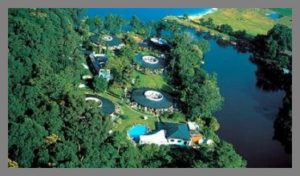 A young Nepali waiter, amused at her obvious discomfort, smilingly suggested that she might enjoy herself more in another part of the country….the next day found Wendy en route to Pokhara, a small town in the foothills of the Himalayas. The young man was right; Wendy settled in right away at a cosy guesthouse and was soon looking around for company and projects to keep her occupied. Wendy was so touched by her experiences she was to spend the next 8 years of her life living in Nepal dedicating her time to the needs of sick children.
A young Nepali waiter, amused at her obvious discomfort, smilingly suggested that she might enjoy herself more in another part of the country….the next day found Wendy en route to Pokhara, a small town in the foothills of the Himalayas. The young man was right; Wendy settled in right away at a cosy guesthouse and was soon looking around for company and projects to keep her occupied. Wendy was so touched by her experiences she was to spend the next 8 years of her life living in Nepal dedicating her time to the needs of sick children.
She volunteered to join a community group who were rebuilding the local school, which had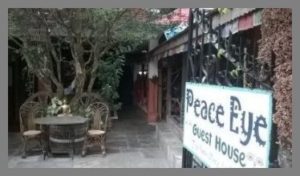 shut down due to lack of funds and support. This work brought her into frequent contact with the local children and it was at this time that she befriended Harimaya Upreti, a frail little girl who seemed to be suffering from extreme weakness and shortness of breath. On enquiry, Wendy was told that the child was dying, no-one knew why; but in that family some of the children did not live long (2 older siblings had already died). Harimaya’s parents, with no hope of being able to afford medical care, had never taken her to a doctor and had sadly resigned themselves to the fact they would inevitably lose another child. Touched by their grief and Harimaya’s sweet smile, Wendy persuaded them to let her take Harimaya to Kathmandu (a 8 hour bus ride from Pokhara) to see a doctor at the Kanthi Hospital. Eventually she was given the devastating news that Harimaya had thalassaemia and that she would die unless she had regular blood transfusions. So began the mission which still occupies Wendy’s life.
shut down due to lack of funds and support. This work brought her into frequent contact with the local children and it was at this time that she befriended Harimaya Upreti, a frail little girl who seemed to be suffering from extreme weakness and shortness of breath. On enquiry, Wendy was told that the child was dying, no-one knew why; but in that family some of the children did not live long (2 older siblings had already died). Harimaya’s parents, with no hope of being able to afford medical care, had never taken her to a doctor and had sadly resigned themselves to the fact they would inevitably lose another child. Touched by their grief and Harimaya’s sweet smile, Wendy persuaded them to let her take Harimaya to Kathmandu (a 8 hour bus ride from Pokhara) to see a doctor at the Kanthi Hospital. Eventually she was given the devastating news that Harimaya had thalassaemia and that she would die unless she had regular blood transfusions. So began the mission which still occupies Wendy’s life.
Wendy searched for information on thalassaemia on the internet and made contact with Mr Durga Pathak, a small businessman based in central Kathmandu, who was doing his own research on behalf of his niece, another thalassaemia patient. She also contacted the UK Thalassaemia Society (UKTS) at that time, and began a line of communication with UKTS which continues to the present day.
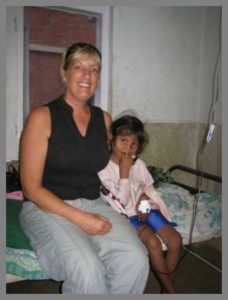 With Wendy’s help, little Harimaya’s parents started to take Harimaya to Kathmandu every month for transfusions; and thereby learnt the reality of living with thalassaemia in Nepal. For the few who can afford to pay, transfusions can be purchased at the foul-smelling Kanthi Hospital, which is infested with cockroaches and rodents. The carer of the child must undertake a return bus trip across town to the Red Cross Blood Bank to collect blood, which the hospital does not provide. In the heat of the monsoon season the blood is frequently degraded and unusable by the time they get back to the hospital. The child’s carer also has to go to a pharmacy and purchase the needles, cannulae and any necessary items for completing the transfusion as none of these are provided by the hospital. The admission process can take up to 3 days; followed by the transfusion which can take up to 2 days. The risk of infection to the child during this time is very grave due to the unsanitary state of the hospital. During this time any carer with the child has nowhere to sleep other than the floor or the streets.
With Wendy’s help, little Harimaya’s parents started to take Harimaya to Kathmandu every month for transfusions; and thereby learnt the reality of living with thalassaemia in Nepal. For the few who can afford to pay, transfusions can be purchased at the foul-smelling Kanthi Hospital, which is infested with cockroaches and rodents. The carer of the child must undertake a return bus trip across town to the Red Cross Blood Bank to collect blood, which the hospital does not provide. In the heat of the monsoon season the blood is frequently degraded and unusable by the time they get back to the hospital. The child’s carer also has to go to a pharmacy and purchase the needles, cannulae and any necessary items for completing the transfusion as none of these are provided by the hospital. The admission process can take up to 3 days; followed by the transfusion which can take up to 2 days. The risk of infection to the child during this time is very grave due to the unsanitary state of the hospital. During this time any carer with the child has nowhere to sleep other than the floor or the streets.
Without Wendy’s help, Harimaya’s parents (like the majority of people in Nepal) would never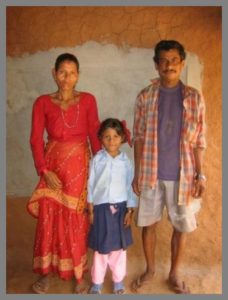 have been able to contemplate the expense of journeys to the capital and the medical treatment. Only a few lucky enough to live in the capital city – and able to pay for their blood – had any possibility of receiving transfusions and thereby avoiding certain death. In this context, Wendy started to think about all the other children like Harimaya, living in remote towns and villages with no medical care. She and Durga Pathak envisaged an ambitious plan to set up a blood transfusion clinic for children affected by thalassaemia, somewhere clean, safe and comfortable and near to the Red Cross Blood Bank so that blood safety would not be compromised by having to transport the blood across the city.
have been able to contemplate the expense of journeys to the capital and the medical treatment. Only a few lucky enough to live in the capital city – and able to pay for their blood – had any possibility of receiving transfusions and thereby avoiding certain death. In this context, Wendy started to think about all the other children like Harimaya, living in remote towns and villages with no medical care. She and Durga Pathak envisaged an ambitious plan to set up a blood transfusion clinic for children affected by thalassaemia, somewhere clean, safe and comfortable and near to the Red Cross Blood Bank so that blood safety would not be compromised by having to transport the blood across the city.
Thanks to Wendy’s fund raising efforts in the UK and Durga Pathak’s persistent striving to make a difference in Nepal, the Thalassaemia Clinic was opened in 2009 in a rented building situated close to the Red Cross Blood Bank. The clinic currently treats 140 patients, the majority of whom are young children. Since it opened, Wendy’s fund raising has been solely responsible for the entire costs of running the clinic.
Services provided by the clinic include:
Free blood transfusions
Nursing care
Some limited assistance with travel costs, as and when funds are available
A clean, comfortable environment – the clinic has a TV and shows educational videos to the children during transfusions; for many of them this is the only time they ever see a TV
A point of contact for advice and support – the only lifeline available in Nepal for poor families affected by thalassaemia. Before the clinic there was nowhere for any of them to turn for help and advice.
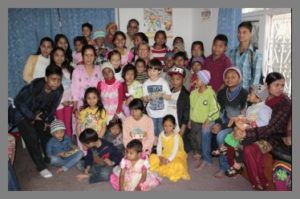 Desperate new patients frequently come to the clinic, having heard by word of mouth that there may be help available; some have walked for days to get there, being unable to afford even the most basic forms of travel. Some patients travel hundreds of kilometers, 24-72 hours by bus, for every transfusion. NTS provides some assistance with travel costs for the poorest families, but does not have the means to provide travel costs for all. There are many thalassaemia patients who never make it to Kathmandu at all due to the high cost of travelling to the capital.
Desperate new patients frequently come to the clinic, having heard by word of mouth that there may be help available; some have walked for days to get there, being unable to afford even the most basic forms of travel. Some patients travel hundreds of kilometers, 24-72 hours by bus, for every transfusion. NTS provides some assistance with travel costs for the poorest families, but does not have the means to provide travel costs for all. There are many thalassaemia patients who never make it to Kathmandu at all due to the high cost of travelling to the capital.
The clinic aims to finish each transfusion within a few hours on the same day, as the costs of accommodation in Kathmandu are prohibitive. Even so, many families have such a long journey that they have no alternative other than to sleep in the streets. One of the goals of NTS is to be able to provide basic hostel accommodation for families so that they do not have to sleep rough each night they are in Kathmandu for transfusion.
Travel costs can range from £2 – £20 per family depending on the distance; and are only provided in cases of extreme poverty.
Some of the Nepalese families have more than one child with thalassaemia….
 Sarasuti and Niru are two sisters who come from a very poor family. Their father is a porter and earns just 500rs (the equivalent of £4.00) per day. He works 14 hour days and is often away from home for weeks at a time leaving his wife to manage the girls’ treatment. Having free treatment at the clinic is a massive help to them but even just paying for the journey there is a strain and many times the girls have to miss their transfusions so their parents can put rice on the table. NTS would very much like to be able to offer the girls and their parents help with their travel and accommodation so that they never have to miss their life saving treatment.
Sarasuti and Niru are two sisters who come from a very poor family. Their father is a porter and earns just 500rs (the equivalent of £4.00) per day. He works 14 hour days and is often away from home for weeks at a time leaving his wife to manage the girls’ treatment. Having free treatment at the clinic is a massive help to them but even just paying for the journey there is a strain and many times the girls have to miss their transfusions so their parents can put rice on the table. NTS would very much like to be able to offer the girls and their parents help with their travel and accommodation so that they never have to miss their life saving treatment.
 Sunil and Anil Rai are brothers from Chitwan, 8 hours from the clinic in Kathmandu. Their father is a simple farmer but has no land of his own, he is a labourer and earns just 300rs (£2.50) per day. Sunil and Anil have now had to leave their family home to live with their aunt and uncle in Kathmandu to be near the clinic. It is heart breaking for both the children and their parents as they can only come together as a family at festival times. Both of these boys have thalassaemia.
Sunil and Anil Rai are brothers from Chitwan, 8 hours from the clinic in Kathmandu. Their father is a simple farmer but has no land of his own, he is a labourer and earns just 300rs (£2.50) per day. Sunil and Anil have now had to leave their family home to live with their aunt and uncle in Kathmandu to be near the clinic. It is heart breaking for both the children and their parents as they can only come together as a family at festival times. Both of these boys have thalassaemia.
They live on a very remote mountain ridge that was destroyed by the earthquake in 2015 many hours from Kathmandu.
Their mother and father carry one boy each once every 2 weeks to walk to the clinic to receive their transfusions. In the enormous 8.4 magnitude earthquake that hit in 2015 the family were left with devastating loss. Their home and most of their livestock was lost, Ayush was trapped under their fallen ruins for many hours leaving him with terrible injuries. This family was hit in the most tragic way, no home, no buffalo, no chicken or goats… how could they ever survive. They slept out in the open beside the ruins of their home with nowhere else to go for many months just grateful to be alive. Eventually NTS were able to get supplies of corrugated tin up to the remote area and a temporary shack was built. This is where the family remains to this day.
Chelation treatment
Currently only a very small handful of the NTS children are able to have chelation treatment due to the high costs of the medicine. The transfusions provided by NTS are keeping them alive – for now – but slowly, invisibly, the iron is building up in their frail little bodies. Without chelation, their hearts and other vital organs will inevitably start to fail. With the average monthly adult income in Nepal being just £20-£40 per month the £30 per month cost of chelation medicine is just unaffordable.
NTS has been working incredibly hard and continues to this day to try and seek individual sponsors for each child’s medicine. Now that the clinic is fully established our aim is to put into place the provision of essential medicine. The average cost of this is £30.00 per child.
Doctor
NTS currently does not have the funds to employ a full time doctor and although Dr Ajit, The head of Kathmandu Paediatrics offers his services for free to all children if is very often impossible to track him down around the city. NTS is working towards raising the £6000.00 per year salary to have an in-house doctor.
